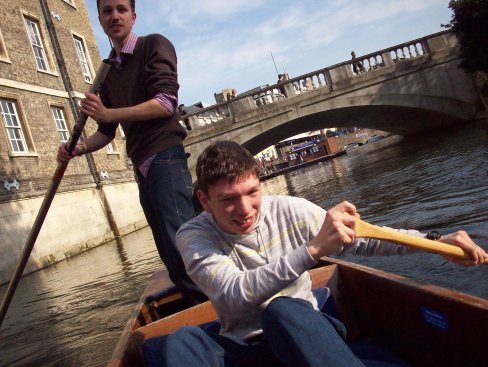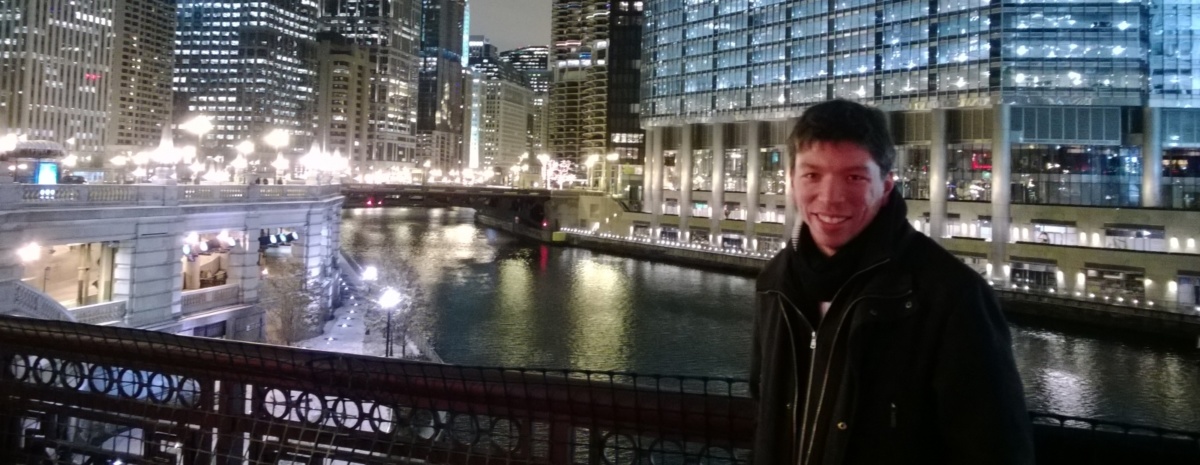‘Energetic’ and ‘imaginative’ best describe the 4-year-old. Often impatient and silly, they discover humour and spend a great deal of time being silly and telling you ‘jokes.’ A 4-year-old’s language may range from silly words such as ‘batty-watty’ to profanity. Loud, boisterous laughter may accompany such language. Imagination suddenly becomes greater than life for the 4-year-old, who often confuses reality and ‘make-believe.’ Wild stories and exaggerations are common.
Continuing the trend from last year, I thought I’d let you into the developmental stages of the average 4-year old, as today this blog celebrates yet another birthday! Sometimes I feel a little bit like My Family – scorned by the critics who prefer meatier stuff but plodding along quite happily nonetheless, albeit with drastically declining standards…
Anyway, I had hoped to bring you something in the way of history – perhaps an e-mail happily announcing the blog to the world? – but I found nothing of interest at all back in April 2004, and very very interesting things from May 2004 which unfortunately have nothing to do with this blog. (No, I’m not saying anything more… other than that they prove someone a liar, and someone else deeply forgetful. All in the past, though ![]() )
)
Back in the present: essay title is tricky, and I’m really not sure how I’m going to answer it, but I have some more time yet before I have to decide. And the weather is still lovely!

Action shot!
So Sophie, Joe, Irfan, Oliver, Owen, Abi and I finally went punting! Check out some of the photos in the yes-this-is-the-first-one-in-ages photo gallery, or the full set on Facebook.
First things first: I thought my mock exam this morning was as amusing poor as I predicted it would be, thanks for asking, though not in a way that makes me feel depressed. They used the past paper we suspected they’d use, so Abi and I recruited the spider diagrams we’d made together yesterday, meaning that at least we did have something to write, even if it wasn’t very good! Everyone started to laugh as we left the hall, so we’re pretty much in the same boat, and the rest of the day has had a nice ‘weight off mind’ vibe to it ![]()
I had lots of nice things in my pigeon hole to greet me afterwards, anyway, including… my postal vote! I think we should just stop and consider how marvellous this is for a second. No, not the democratic process, since it’s just an infrequently polled and statistically insignificant input, but more the fact that Brent council – Brent council! – actually got the whole thing working on time. Seriously, not a single link in the chain failed… from my ‘head of household’ putting me on the register (ta for that) to Royal Mail delivering (though they better get the next bit right too). Even more incredibly, they seem to have beaten Barnet in sending the postal votes out. Brent Time* was clearly progressing at a zippy pace for once.
Anyway, I carefully used all four of my votes – because I’m a good citizen – and sent it back. In total, I’ve managed to spread my democratic goodness across three different parties, which is just sharing the love. But that’s not all! Because also in my pigeon hole was the exciting news – via polling card – that there actually is a vote in my ward of the Cambridge City Council, which is part of the something-bigger Council, which – I had to have a website explain to me – is how the system works outside of London. But now I have the dilemma – who do I vote for? Do I vote at all? Is an ill-informed vote where I have no real interest actually worse than an absent vote? Am I really a ‘resident’ given that I’m here for less than half of the year, don’t pay any tax and barely use any local services? If you’d like to provide the answers below, I’d be much obliged.
And one final thing: as you may see, I’ve started to blog a little bit on the Peterhouse Politics Blog, which is syndicated here in a nostalgic throwback to the DomSez of old. But I’m sure you’ve all had enough of reading me already.
(*Joke with a target audience of one.)
There was a certain irony in the fact that the Archbishop of Canterbury’s poorly thought out invitation to implement portions of Islamic law in Britain provoked such a united display of condemnation. In a country which is supposedly so conspicuously lacking a shared culture, we saw secular liberals, conservative pundits, briefly united political parties and the general public of every faith and none joining together to make the simple cry: one law for all. We might all differ wildly on what that law should be, but on that – at least – we all seem to be in agreement, the Archbishop notwithstanding.
Reach a little wider and the consensus falls apart. Newspapers make great hay out of the evils of ‘political correctness’, which apparently has been waging unceasing war on such things as heterosexuality, the English language and Christmas. I can’t say I’d noticed a conspicuous shortage, but there you are. Outside the pages of tabloids there is some more serious questioning of multiculturalism, although I have to say I still think it’s a conversation largely between journalists and politicians. Nevertheless, issues surrounding how far we accommodate different cultures and\or whether we have – or need – a national common identity are real enough, even if the answers so far have been limited to bizarrely silly plans for a few more flags, ceremonies and mottos.
I believe in multiculturalism, and it doesn’t particularly concern me whether people identity with abstract notions of what it means to be British. As far as I’m concerned, you can listen to whatever music you want, support whatever football team you want and even speak whatever language you want as long as you don’t interfere with other people’s rights to do the same. Nevertheless, I do think that an important part of the answer for more cohesive communities lies in a very simple idea: shared spaces. This isn’t a tired debate on the merits of public versus private ownership, for almost everyone agrees that in-between our private houses, private workplaces and private leisure facilities there will always exist a little communal space which we all have to use.
Without wanting to bore anyone about the London mayoral elections (full disclaimer: I’ve campaigned for Ken Livingstone) the example of London’s transport system is a strong one. London is the only major city in the world to have achieved a notable shift from private to public transport in recent years, and I believe that this is important for more than purely the environmental benefits. Take the buses. There will always be a core of people who have no choice but to travel by bus, but if buses become a genuinely shared space – the poor and dispossessed travelling alongside the rich and comfortable – then there will be both the money and the political pressure to improve services for everyone. It’s not a hopeless fantasy: people from every different walk of life already use the Tube to get to work.
It’s the same for state education and healthcare. A number of people have claimed to me that by going private they’re actually doing the state a favour: that’s one fewer hospital bed or school place for the state to find, they argue. But this ignores the value of maintaining shared public spaces. First, because those who can afford to go privately are often the ones who will be most vocal in demanding and effecting change in the public sector. And secondly, because shared spaces are also a shared national culture which isn’t imposed on top of communities but develops organically from their equal participation. Rather than wasting time on the abstract – the flags, the pledges – we should encourage a country which forms its own identity from real things, like children learning together in shared schools.
You can’t force people to use shared spaces, and you shouldn’t have to. No-one should take the bus or use the NHS with a haughty sense of martyrdom: they should be high quality services which are attractive in their own right. And the danger of abandonment always looms large with shared spaces: think of a housing block, neglected and unloved after the initial political optimism in building it has long faded away. But there will always be people left behind after others have escaped – and there will always be people on the bus. If we invest in these services and design them to be used by everyone, then I believe we will gain not just improved public spaces but an improved public spirit too.
You can comment on this article here.

Dalek cookies!
Thank you, Oliver and Abi! These two generous souls rustled up some Dalek cookies before I arrived and presented them to me tonight, as these pictures testify. Cooking-wise it actually all went a little bit wrong, and sadly it’s not quite possible to eat the gently charcoaled cookies in addition to admiring their beauty, but to be honest hearing the story of the gyp room filling with so much smoke during their creation that they had to be taken outside for fear of setting the fire alarm off was just as entertaining. Anyway, it was lovely, so thanks ![]()
I have (mostly) unpacked, and am all set to have a solid day of revision tomorrow with Abi for the Paper 6 mock on Monday. But, much to my relief, there are at least two others who feel that it really isn’t that big a deal, as the mock doesn’t really mean anything, and going in with low expectations might be the best thing to do under the circumstances! Then term will start officially on Tuesday, with Themes and Sources returning for Wednesday (mental note – do the work for that ASAP…) and lectures beginning on Thursday. Apart from the fact that the lecture timetable this term is very sparse – as most subjects have exams – and I don’t think I actually have any on Thursday at all. More reading time, I guess ![]()
And yes, of course I’m still watching Doctor Who. How did anyone survive without the iPlayer?!








